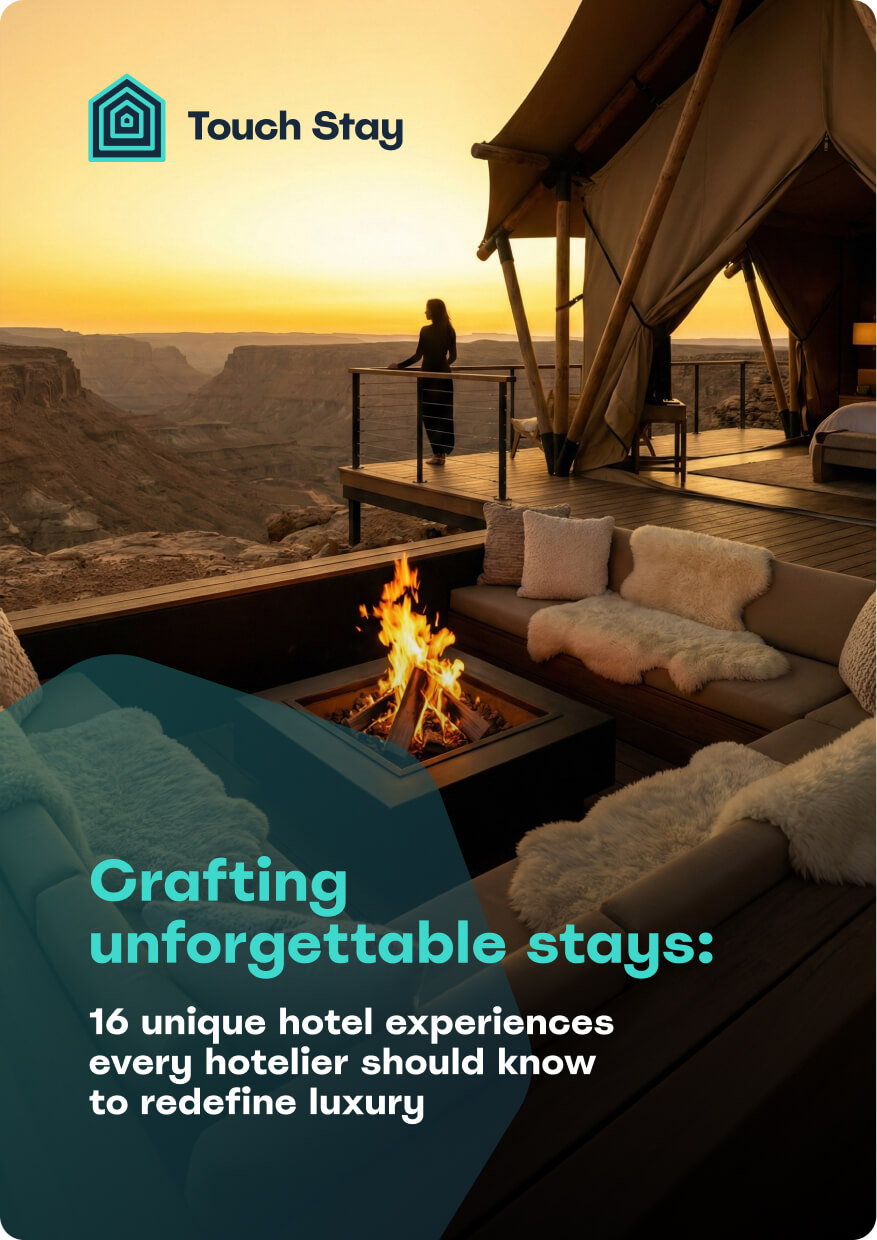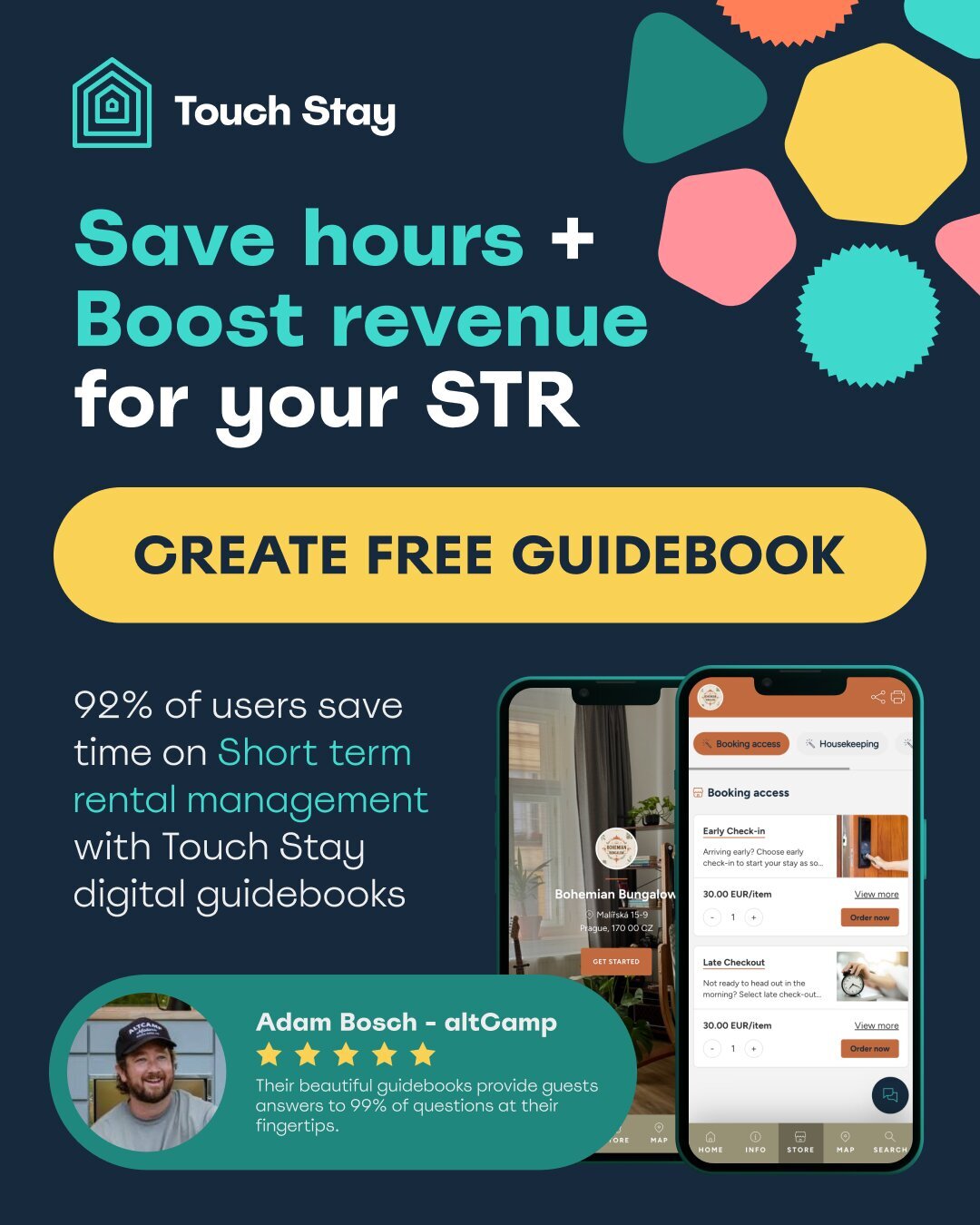Welcome to Touch Stay’s definitive guide to corporate housing – your go-to resource for understanding everything about corporate apartments. Whether you're a seasoned property investor, a curious host looking to diversify your offerings, or simply seeking clarity on what is corporate housing, this comprehensive blog post will delve into the intricacies of this thriving sector.
We'll explore its definition, how it operates, its profitability, the key factors that make a corporate apartment stand out, plus how a Touch Stay digital guidebook can streamline your journey into corporate housing. Navigate through the essentials using the links below and discover how you can excel in the world of corporate rentals.
- What is corporate housing?
- Corporate apartments vs. traditional short-term housing
- How does corporate housing work?
- Why is the corporate housing business profitable?
- Benefits and drawbacks of corporate apartments
- What type of guests benefit from corporate housing?
- What are the costs associated with corporate housing?
- What should be included in a corporate housing apartment?
- How to get more bookings in the corporate housing business
- Frequently asked questions
Start your corporate housing journey with Touch Stay!
What is corporate housing?
Let's start with the fundamentals: what is a corporate apartment and, more broadly, what is corporate housing? Corporate housing encompasses fully furnished apartments, houses, or serviced residences offered for short to mid-term stays, typically spanning weeks to months.
Unlike standard hotels or typical short-term lets, corporate housing provides a more comfortable, home-like setting for individuals away from their permanent homes due to work, relocation, or other specific needs. These properties are generally equipped with all necessary amenities, including furniture, kitchenware, linens, and often utilities and internet, ensuring a seamless move-in experience.
Corporate housing primarily serves business professionals in various scenarios:
- Temporary work assignments or projects
- Relocation requiring interim accommodation
- Extended training programmes or conferences
- Travelling consultants or contractors
- Employee secondments
Beyond the corporate sphere, it also caters to:
- Individuals/families during home renovations or insurance displacements
- Medical professionals on short-term placements
- Film/production crews working on location
- Individuals needing temporary accommodation during transitions
Corporate apartments vs. traditional short-term housing
Understanding the distinction between corporate apartments and traditional short-term housing is key. Both offer temporary stays but differ in crucial aspects.
- Cost: Corporate housing can be more economical for longer stays than hotels. While daily rates might exceed standard short-term rentals, the all-inclusive nature (utilities, internet) offers savings for stays over a few weeks. Traditional short-term rentals' costs vary and often exclude utilities.
- Amenities: Corporate apartments are designed for extended stays, featuring fully equipped kitchens, laundry facilities (in-unit or on-site), and furnished living/sleeping areas. Standard short-term rentals vary in amenities, with kitchens not always fully equipped and laundry not always available.
- Flexibility: Corporate housing offers more flexible lease terms, often month-to-month after a minimum stay, ideal for uncertain timelines. Traditional short-term rentals usually have fixed booking periods.
- Use cases: Corporate housing caters to business travellers and those needing mid-term accommodation for professional or transitional reasons, focusing on comfort and functionality. Traditional short-term rentals target a broader market, including tourists, emphasising location and unique experiences.
Pro tip: Discover how to attract business travellers to your rental
Corporate housing bridges the gap between hotels and long-term leases, providing a fully equipped, flexible, and cost-effective solution for extended temporary accommodation.
How does corporate housing work?
To fully understand, let's explore how does corporate housing work? The process generally involves:
- Property sourcing: Providers own, lease, or manage properties suited for corporate clients, often located near business hubs or transport links.
- Furnishing and equipping: Properties are fully furnished to a high standard, including kitchens with cookware, laundry facilities, and comfortable living spaces, ensuring a move-in ready environment.
- Booking process: Bookings are typically made through corporate housing companies or direct property management, often involving inquiries, quotes based on stay duration and needs, and short-term lease agreements.
- Lease terms: Flexible terms are common, often with a minimum stay (e.g., 30 days) followed by month-to-month options, accommodating variable schedules.
- Management and support: Providers handle property management, including maintenance, repairs, and guest support, ensuring a hassle-free experience, with potential additional services like housekeeping.
- Check-in/check-out: Processes are designed to be straightforward and efficient for guests.
Corporate housing operates by offering fully equipped and managed residential properties with flexible leases for extended temporary stays.
New to corporate hosting? Try Touch Stay for free and discover how much time you can save!
Why is the corporate housing business profitable?
The corporate housing sector offers a lucrative business model due to increasing demand for flexible, mid-term accommodation driven by evolving work trends.
- Rise in business travel and project work: Globalisation and project-based work increase the need for extended stays, where corporate housing offers a comfortable, cost-effective alternative to hotels.
- Growth of remote work and relocation: Surprisingly, remote work increases demand as companies hire remote workers needing temporary housing for meetings or initial relocation.
- Demand for flexibility: Businesses and individuals value flexible lease terms and locations offered by corporate housing, adapting to dynamic work and life.
- Higher ADR and occupancy: Corporate housing can command higher Average Daily Rates (ADR) than long-term rentals due to furnishings and shorter leases, often achieving high occupancy rates with effective management.
- Cost savings for companies: Corporate housing is often more economical for companies than extended hotel stays, offering more space and amenities for employee well-being and productivity.
- Resilience to economic shifts: The market can be resilient during downturns as companies seek cost-effective travel alternatives, and essential sectors like healthcare maintain housing needs.
Industry analysts predict a steady growth in the global corporate housing market. According to a report by Global Market Estimates, the global corporate housing market is expected to exhibit a CAGR of 6.5% from 2024 to 2029. This growth is driven by increasing business travel, relocation activities, and the demand for flexible accommodation solutions.
Benefits and drawbacks of corporate apartments
Corporate apartments offer distinct advantages and disadvantages.
| Feature | Corporate apartments | Traditional hotels |
| Space & comfort | More spacious, separate living, sleeping, kitchen areas | Often smaller, combined living/sleeping areas |
| Cost (longer stays) | More economical for stays over a week or two | Can be significantly more expensive for extended stays |
| Amenities | Full kitchen, often laundry facilities, workspace | Limited kitchen facilities, laundry often extra cost |
| Services | Housekeeping often included, fewer on-demand services | 24/7 services (room service, concierge) readily available |
| Flexibility (short stays) | Less flexible due to minimum stay requirements | More flexible for very short durations |
| Sense of "home" | More home-like, supports maintaining routines | More temporary, less personal feel |
| Productivity | Dedicated workspace often available | Workspace may be limited or less comfortable |
Benefits:
- Home comforts: More spacious and comfortable than hotels, with separate living, sleeping, and kitchen areas, allowing guests to maintain routines.
- Cost-effective for longer stays: More economical than hotels for stays over a week or two, with included utilities and the option to cook meals, leading to savings.
- Enhanced productivity: Home-like setting with potential workspaces allows for better productivity than often-cramped hotel rooms.
Drawbacks:
- Less flexible for very short stays: Minimum stay requirements make them less suitable for brief trips; hotels are better for short durations.
- Potentially fewer on-demand services: While housekeeping is often included, 24/7 hotel services like room service might not be available.
- Can feel less ‘hotel-like’: The emphasis on independent living might not suit travellers who prefer full-service hotel experiences.
What type of guests benefit from corporate housing?
Corporate housing caters to a diverse range of guests:
- Business travellers on extended assignments: Professionals needing comfortable, functional accommodation for weeks or months due to work projects.
- Relocating employees and their families: Provides interim housing while searching for permanent homes in a new city.
- Consultants and contractors: Offers flexible and convenient accommodation near client sites for project-based work.
- Individuals undergoing home renovations or insurance displacement: Provides temporary, fully equipped living spaces when primary residences are uninhabitable.
- Medical professionals on short-term placements: Offers convenient housing near hospitals or clinics for temporary assignments.
- Film and production crews: Provides practical accommodation for teams working on location for extended periods.
What are the costs associated with corporate housing?
Running a corporate housing business involves several key expenses:
- Property acquisition/leasing costs: Purchase price or monthly rent, significantly impacted by location and property condition.
- Furnishing and decor: Initial investment in furniture, decor, and soft furnishings, with ongoing replacement needs.
- Kitchenware and linens: Equipping kitchens and providing quality linens with regular laundering or replacement costs.
- Utilities: Often included in the rental rate (electricity, gas, water, internet), requiring careful cost management.
- Property management and maintenance: Costs for day-to-day operations, including repairs and guest communication, whether self-managed or outsourced.
- Housekeeping services: Labour and supply costs for regular or on-demand cleaning services, a key guest expectation.
- Marketing and advertising: Expenses for online listings, website maintenance, and potential partnerships to attract bookings.
- Insurance: Essential coverage, including property and liability insurance, to protect investments and operations.
- Taxes and licensing: Local taxes and fees associated with operating short-term/mid-term rentals.
Pro tip: Learn more about associated costs with our guide to property management fees
What should be included in a corporate housing apartment?
A well-equipped apartment is crucial for a comfortable corporate guest experience:
Starter toiletries and linens
Welcome guests with essential starter toiletries (shampoo, soap, toilet paper) and high-quality linens (bedding, towels, kitchen towels).
Decor and furniture
Create an inviting atmosphere with comfortable sofas, dining sets, quality beds, bedroom furniture (wardrobes, bedside tables), appropriate lighting, window coverings, and homely decor.
Kitchen items
Provide a fully equipped kitchen including a full-sized refrigerator, oven, hob, microwave, dishwasher (if applicable), coffee maker, kettle, toaster, complete cookware, cutlery, crockery, glassware, essential utensils, cutting boards, and basic condiments.
Access to parking and housekeeping services
Offer dedicated parking or information on nearby options. Provide regular housekeeping services (e.g., weekly) with the option for additional cleaning.
Utilities and Wi-Fi
Ensure seamless access to included utilities (electricity, gas, water) and reliable, high-speed Wi-Fi with clear login details.
Access to amenities
Enhance appeal with access to building/community amenities like a gym, pool, business centre, or communal lounges.
Cleaning supplies
Provide basic cleaning supplies (vacuum, mop, cleaning sprays, dish soap) for guests to maintain the apartment between professional cleans.
Pro tip: Learn more with our ultimate guide on how to furnish a vacation rental home
How to get more bookings in the corporate housing business
Attracting and retaining corporate clients requires a strategic approach:
- High-quality listings: Professional online listings with high-resolution photos, detailed amenity descriptions, and accurate availability highlighting corporate benefits (workspace, Wi-Fi, location).
- Competitive pricing: Research the market to ensure competitive pricing reflecting value and amenities, consider discounts for longer stays or corporate clients.
- Excellent customer service: Prompt communication, efficient processes, and responsive support for positive reviews and repeat bookings.
- Build business relationships: Proactively connect with local businesses, relocation firms, and HR departments to become a preferred provider.
- Offer flexible lease terms: Accommodate varying needs with flexible options like month-to-month agreements after an initial minimum stay.
- Provide a seamless experience: Ensure easy booking and clear support throughout the guest's stay.
- Gather and respond to feedback: Encourage reviews and use feedback to improve properties and services, addressing negative feedback professionally.
- Leverage digital tools: Use property management software to streamline operations.
- Create a digital welcome book with Touch Stay: Enhance the guest experience and reduce questions by providing all essential property and local information digitally, improving satisfaction and increasing bookings.
- Network within the industry: Attend events and connect with other professionals to stay updated.
Make your journey into corporate housing a breeze with Touch Stay! Create your digital welcome book today.
Frequently asked questions
Find corporate housing through specialised corporate housing companies, online booking platforms (including those expanding to mid-term), direct property management firms, referrals, and relocation specialists.
Corporate rent is the rental rate for corporate housing, often higher than long-term rates due to included furnishings, utilities, and services. It's usually monthly but can vary by location, size, amenities, and stay duration, with potential corporate discounts.
A corporate tenant is an individual or business renting corporate housing, often employees on work assignments or relocation. They typically need fully furnished properties with flexible leases and business-friendly amenities.
Stays typically range from a few weeks (often 30 days minimum) to several months, sometimes up to a year or longer, offering flexible lease terms to accommodate varying needs.

Ned
Ned has clocked up over 11 years in digital marketing and comms, with a strong focus on creating engaging content for a range of brands and agencies. When he’s not writing, he can be found digging for records, peering through his telescope at the night sky, or onboard his local lifeboat where he volunteers as a crewmember.
Be the first to know!
Join our newsletter for early access to:
- ✅ Free guides
- ✅ Pro tips & tricks
- ✅ Time saving tutorials
- ✅ Latest blog posts
- ✅ Checklists & templates






















.webp?width=50)